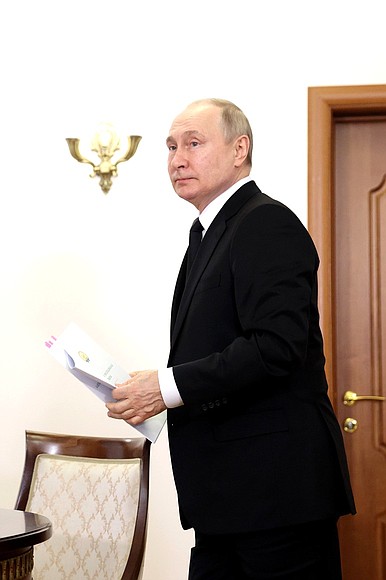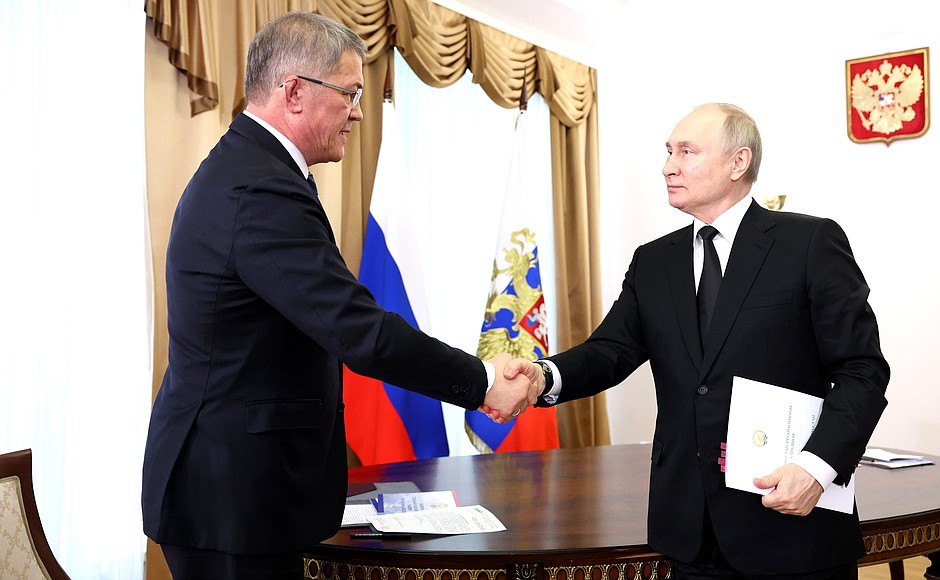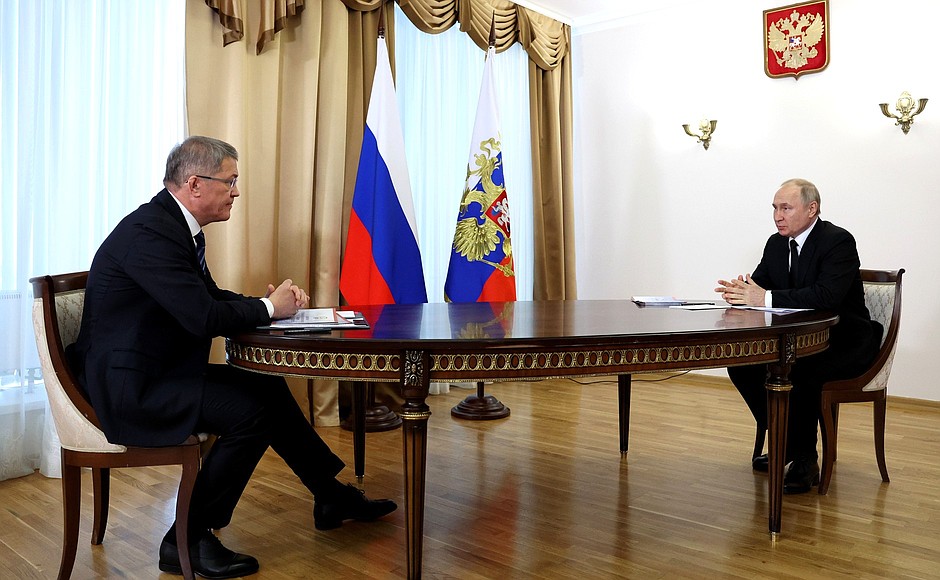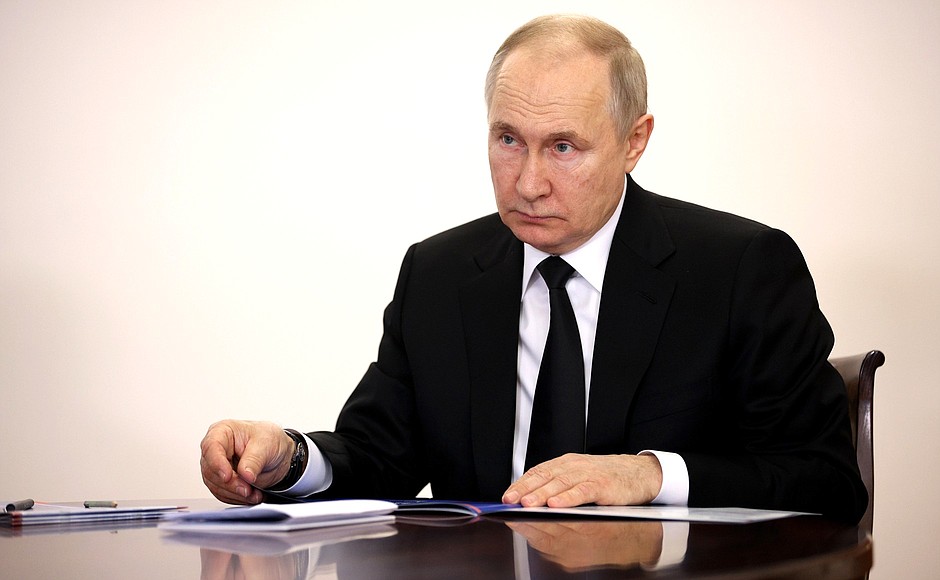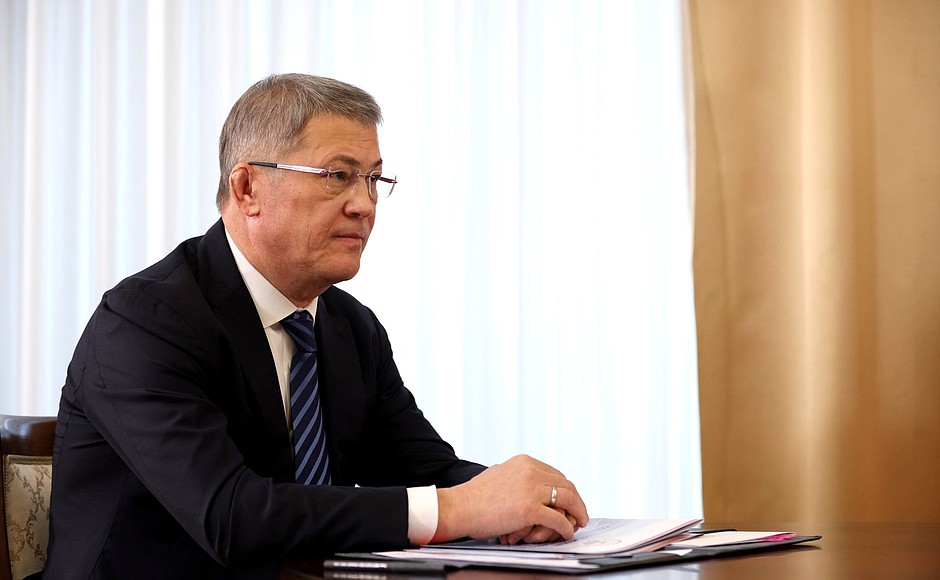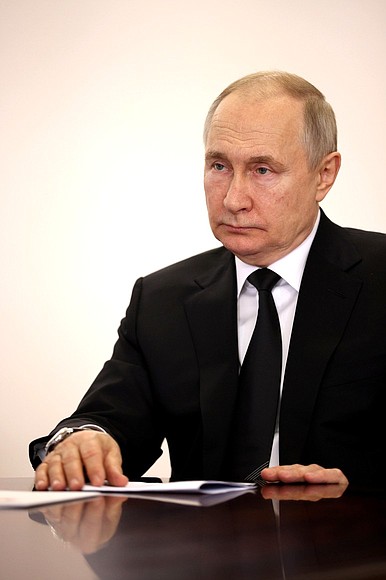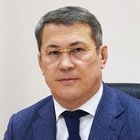President of Russia Vladimir Putin: Mr Khabirov, good afternoon.
Let me start by saying that we are meeting on a day of sorrow: we are paying our last respects to the first head of the republic, Murtaza Rakhimov. I knew him well. We had good relations.
See also
I would like to say that he made a meaningful contribution to developing the republic in its new status as a constituent entity of the Russian Federation. He carried out a well-balanced ethnic policy and was proactive on the national stage. It would not be an exaggeration to say that he played an instrumental stabilising role at a turning point in the history of Russia. He must be credited for his extensive efforts.
Under his leadership for almost 20 years, the republic carried on and recovered after the tragic dissolution of the Soviet Union and has achieved a great deal. I know that you were part of his team and worked with him.
I would like to convey my sincere condolences to this family and friends, to the republic’s leadership and all the people of Bashkortostan.
Head of the Republic of Bashkortostan Radiy Khabirov: Thank you.
Vladimir Putin: Let me reiterate that much has been done on his leadership, enabling the republic to acquire positive momentum in its development.
You are posting positive growth on all the key indicators: the regional domestic product has been growing, and so has industrial output and agriculture. You have one of the lowest unemployment rates in Russia. Fixed capital investment exceeds the national average, which means that the republic is sure to see robust growth rates in the near future.
I would like to thank you and your team, as well as all people of Bashkortostan for this work, and I wish you every success in your future undertakings.
However, there are matters which require special attention from your entire team and you personally. Of course, I am referring to the environment, healthcare, and developing the ambulance service within the healthcare system. There are things to improve here, and you know this. It is my understanding that you are working on these issues.
I suggest we discuss all the elements requiring, in your opinion, joint efforts both on the regional and federal levels.
Radiy Khabirov: Mr President,
Let me start by thanking you for taking the time to say your final farewell to Murtaza Rakhimov on his last journey. Indeed, we were close, and he always held you in high regard and was a true patriot of Russia. Thank you very much on behalf of the residents of Bashkortostan. We take pride in this; it is a great honour for us, and of course, a tribute to our first president.
Mr President, I would like to briefly report on the main outcomes.
Guided by your instructions, we have set the main goal for ourselves, which is to ensure economic stability. But we do not plan to simply ensure stability since we do not want to stop it from growing.
That is why we will end this difficult year with a higher production index. Agriculture has grown significantly. In general, crops were strong throughout Russia, and we had a very good harvest as well. Most importantly, we have upgraded our production assets.
Investment is doing well in Bashkortostan. In 2019, 2020 and 2021, that is, within a span of three years, investment grew by 31 percent. There is no data for 2022 yet, but it will show growth as well. I once told our investors that, at some point, Bashkortostan was underappreciated by investors. We have now created an environment for people to come and develop, and are now doing quite well in this area.
We carefully watched the economic forecasts and we were worried about our ability to withstand the headwinds, but we are withstanding everything, including the sanctions’ pressure. This was our key goal.
Mr President, of course, our main task now – we understand it – and our entire team and all of Bashkortostan have geared up to support the special military operation. Here is how we see our input.
Of course, supporting defence capability comes first. We have a fairly large number of defence enterprises. They are operating efficiently, and we do not have any problems with them.
Supporting our service personnel comes second. We have a fairly large number of service members participating in the special military operation and many mobilised personnel. We have formed three volunteer battalions: two battalions operated by the Defence Ministry and a National Guard volunteer battalion, which left the republic a month ago.
All three battalions are coordinated quite well. Two battalions have been taking part in the hostilities since late August or early September, and it was important for us to support them.
It is also important that we support our mobilised service personnel. What have we done? We have put in place a logistics warehouse here and another one in Krasny Luch in the Lugansk People’s Republic. Twice a month we send large convoys there. They go to Krasny Luch where my representatives are working, and then we start distributing what they bring among the battalions and mobilised service personnel.
After our mobilised personnel left, I had to address a minor problem – I had to find out where they were serving. I did manage to trace the location of several units with many people from Bashkortostan, thanks to their commanders, who contacted me, so we have also established contact with them. When we come to meet them, we are received warmly. This is the first objective that we have set for ourselves, and we will certainly continue doing this. They need it – we saw this.
Our second objective is providing support for the members of the families of volunteers and mobilised service personnel. This is a lot of people. Still, we have approved a package of 33 measures to support them. They are probably the same as across the country in general, judging by what we learned from the heads of other regions, including free meals for schoolchildren, free travel on public transport, free preschool centres, free extracurricular education, and exemptions from transport charges.
Mr President, you have said this to me many times, that if you handle these matters cold-heartedly, it will not work, even if there are support measures. We have set this objective, and we keep in close contact with these people. I myself keep in touch with many parents and wives. Unfortunately, some men have been killed. If their families have children, we establish personal guardianship over them and take care of them. This is an important issue and we will continue addressing it.
I would like to cite an example: ahead of the New Year holidays, on top of all the benefit payments, we made additional payments to children and family members. I said, “Let us give them gifts from us like a nice backpack, or a lamp, and lots of sweets.” This is several thousand children. We gave out about 20,000 gifts to our children and 15,000 gifts to children living in Krasny Luch. I said, most importantly, that you need to add a human touch to this – not just invite people to take the gifts and go home.
A volunteer said to me, “It is so heartwarming.” I asked him what he was talking about. He said, “My son told me that he was asked to go to the teachers’ room, and he braced himself for a scolding, although he is a good student, and when he went into the room he was given a gift and he realised that his father was on an important mission.
As a matter of fact, even things like this that do not take much effort and money are very effective. We need to work on this. It is true that if you do not put your heart into it, it does not work.
Donetsk and Donbass in general, with which we established relations a long time ago – I once reported about this – represent another important area of our work. Mr President, as you may recall – I reported to you about this – General Shaymuratov from Bashkortostan died outside Debaltsevo. Now, the village of Petrovskoye, the town of Petrovskoye and Krasny Luch are under our patronage. As they say, everyone has been there a million times already.
We have erected a monument and built schools there almost from the ground up. We have built what is probably one of the Lugansk People's Republic’s best schools. It is a very good and spacious school building for 900 pupils. They do not have that many pupils now. I went there before the New Year and wondered where the children were. They told me they have 400 so far, but they are gradually returning.
Our construction workers are taking part in rebuilding Mariupol. We are building a whole new neighbourhood there, and Mr Khusnullin and I have agreed as follows: if you are up to it, he told us, if you feel you can do it, then go ahead and do it. We are rebuilding it step by step. I would like to report to you that this work is well organised. For us, it is one of our key priorities, if not our top priority. So, we will continue this work.
Of course, we are proud of our troops. I believe – and I tell everyone this – that when they come back, they will be the future of our country. I believe it. Many of them are common people. Some are mechanics, others worked at a plant, and so on. They are just everyday ordinary people. But they need attention, and when you talk to them, they become happy as children. This is important, and we are well aware of that.
Vladimir Putin: Of course. When a person is in a life-threatening situation, any kind of attention – not only from family who are worried sick about them – but also from the state and various bodies of authority are key to motivating a person to do what they are supposed to do.
The things that you are doing are critically important. I have said it many times before and I am here to say it again: I am very pleased to note that people in Bashkiria are approaching the situation in this way.
Radiy Khabirov: Thank you very much.
Mr President, if I may, I have several issues to discuss and to ask for your help. I also wanted to convey someone’s greetings and to pass along two things.
First, do you remember how you led the opening ceremony for an enterprise operated by Austrian businessman Josef Lasselsberger? You know what we are busy doing now? We are getting ready to launch the second phase of enterprises here in Ufa. He asked me to convey his greetings to you and said the following, “My birthday is on January 18. I will turn 60 and I will have a birthday party here.“ That is, there are still many people out there around the world who are willing to work with us, are sensible people and are working with us. This is important.
Also, Mr President, I think I did not make it clear enough: the whole republic once again wanted to thank you for giving the Hero star to General Shaymuratov. People talk about it reverently wherever you go. Mr President, we built a large pantheon to honour him. Perhaps you did not see it when you were driving past it. We built a monument to General Shaymuratov, and we will build a colonnade. From there, we see off volunteer battalions and soldiers take their oath there as well. In a word, the square has come alive. Previously, it was a parking lot for 400 vehicles, but now it is a square called Sovetskaya Square. So, with your permission, I will present the photographs to you. Mr President, look to your left when you drive past it. They will let you know when to look.
Vladimir Putin: Very well.
Radiy Khabirov: Now to the issues I would like to ask your support on.
A special zone in Agidel is one of the projects. Agidel is a town in the north of the republic. It appeared in 1980 only because there was an idea, a nuclear power plant was being built there. Due to all sorts of vagaries, the nuclear power plant was shut down, and the town has been practically left hanging. The population is about 15,000 people, and we believe that it needs to be revived; this is the northern part of the republic.
Another project that we are discussing is the navigable Belaya River, which merges with the Kama, which itself empties into the Volga, which flows out to the Caspian Sea. Markets are opening, accordingly, in Iran, for example.
Therefore, the idea was this: to try to work out – I would like to only ask for support at the beginning, and with your support it will go smoothly – the issue of creating a port economic zone. Dredging, of course, is necessary there. There are port berths there, so that is not something new: tankers used to sail there, there was an oil pipeline and Volgotanker shipped petroleum products.
Vladimir Putin: How deep is the riverbed?
Radiy Khabirov: It is now a little more than four metres deep, and, of course, more is needed. But the volumes are low, because it is a short section, we head to the Kama, and there it flies.
And so, I would like to ask you to instruct the Government to work it out together, because a feasibility study is necessary. But, of course, we will need the Government’s help here. I will send you one of the letters. This is my first point.
Vladimir Putin: Fine.
Radiy Khabirov: The second, Mr President, is a large infrastructure menu. I keep telling my colleagues: we should not complain, we have money, money is coming our way. The main thing is to keep track of the details and the deadlines, apply and so on.
We did quite well with the so-called infrastructure budget loans. We are now working on transportation facilities worth some 18 billion.
Vladimir Putin: You have a very good network here, both roads and railways. The density is good.
Radiy Khabirov: Yes. But where does the problem lie? The network is very large, and we have a lot of villages. Some villages are connected with chip roads, and some with gravel ones, and when I calculate the return on investment, and it requires 10 km of asphalt. This is why, of course, we are trying to raise funds from various sources and take part in all government programmes.
What is it about in this case? Ufa is surrounded by three rivers, it is a long peninsula. The southern part, which is densely populated, requires constant expansion of roads. We started working with the Government on this. The essence of the support is simple: we will apply for the next stage of budget loans, public infrastructure loans. We need a large amount, because there is a bridge, a road, and two junctions to be built and renovated. We want to ask that the vitality of this task be taken into account and ask for your support with this issue. I will report separately to Mr Khusnullin later.
Vladimir Putin: Are there any specific facilities there already?
Radiy Khabirov: Yes. They are listed there, Mr President. This is a 650-metre bridge over the Belaya River, the reconstruction of the road junction, and the construction of two new overpasses. I will also write this in the letter, with your permission.
Vladimir Putin: All right.
Radiy Khabirov: Now, one more question. Again, we thought about resolving this issue through the National Welfare Fund, but, as the Ministry of Finance explained to me, the NWF is not used for building social facilities, such as, for example, a hospital for war veterans.
Vladimir Putin: It will not pay off. The National Welfare Fund tries to allocate money, even term long money, for something that pays off.
Radiy Khabirov: But we need a hospital for war and labour veterans.
Vladimir Putin: You just need other funding sources.
Radiy Khabirov: I would like to ask you to consider this issue. We understand that there can be some difficulties.
Vladimir Putin: This is right in Ufa, isn’t it?
Radiy Khabirov: In Ufa. I will brief explain, Mr President.
The hospital is in a building built in 1862 that is a landmark of cultural heritage. We built a new one, of course; Murtaza Rakhimov worked on this. By the way, how it happened with Murtaza Rakhimov; he had been in the hospital for four months in one of the buildings there. I came to him and said, ”We will build a new one.“
We drafted the project and even chose the site. We would like to ask you to include it in the Federal Investment Programme and we can build it; the facility is large and of great importance.
Vladimir Putin: How much does it cost?
Radiy Khabirov: Mr President, ten billion rubles, if I am not mistaken.
Vladimir Putin: All right, all right.
Radiy Khabirov: And, probably, a small question, but I cannot resolve it. I probably would have resolved it long ago if this facility were not a federal facility: it is a circus.
You must have been informed. All our circuses are old, there are many of them in Russia. Our circus has not been open since 2017, that is, for five years. We have 4 million people in our republic, and children and their parents have to go to other regions.
It was necessary to put together a project, the building is very complex. We did the design, but then, when the Ministry of Culture took a look, we had to change it a bit. As a result: we did complete the project, I found extra-budgetary funds. We have the design, but we cannot have an appraisal, as they tell us that there are no funds for construction. I could spread the financing over years, if it was from the budget.
Vladimir Putin: How much will it cost?
Radiy Khabirov: 2.5 billion.
Vladimir Putin: Circus art deserves more attention from the state than before. Surely, there are many issues, both commercial and other, but we have a very high level of circus art, and of course, we need an appropriate material base. I am aware of these issues in general. But you are absolutely right, we need to help them.
Radiy Khabirov: Mr President, taking the opportunity – it is clear that the occasion for the visit was a mournful one – but the republic is developing, new enterprises and cities are appearing.
I wanted to invite you to one of the events. I would like to report, I took part in the 9th Forum of Russian and Belarusian Regions last year. I coordinated it with Ms Matviyenko and invited her to take part. This year, in June, the forum will be held here.
The year 2024 is the year of the 450th anniversary of Ufa, which you have supported. You supported it with your Executive Order, so we would like to show you any time how the republic is developing. We will try not to let you down, Mr President.
Vladimir Putin: Mr Khabirov, thank you for what you do to support the special military operation, for how much you care about supporting the families of our guys who are fighting and defending the interests of our country and our people in Donbas, in the new territories. These are extremely important things, you just said it yourself: how keenly people feel this support and how they perceive it.
It is often not even a question of material support, although it is always at the core of how people live, but attention, moral support – these are extremely important things, this is the motivation that is desperately needed. People need to feel that the country is with them, supports them and understands the role and mission that they are carrying out in the special military operation.
As for the development of the republic, I said it at the beginning of our meeting: it is developing at a good pace, despite all the difficulties and external problems that some are trying to create for us. You have just said it yourself.
A good, very respectable pace has been set in all major areas of development. I hope that it will continue in the same way. I wish you success.
You said yourself that the occasion for this meeting is a sad one – we are saying farewell to the first leader of the republic. I would ask you to think about how best to preserve his legacy.
Radiy Khabirov: Yes, by all means.
Vladimir Putin: He did a lot for the republic. Once again, I would like to emphasise that his balanced policy – both on ethnic affairs and building up the state in general – played a significant, noteworthy and positive role at a very difficult and crucial stage in Russian history.
I wish you, and the entire republic, the very best.
